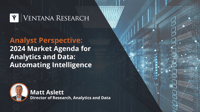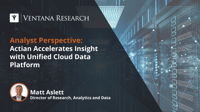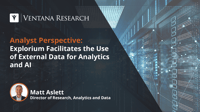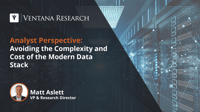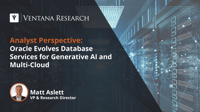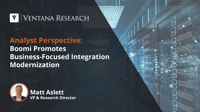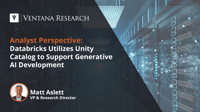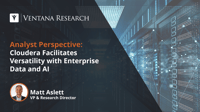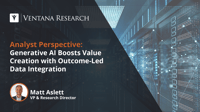We live in an era of uncertainty, not unpredictability. Managing in uncertain times is always difficult, but tools are available to improve the odds for success by making it easier and faster to plan for contingencies and scenarios. Software makes it possible to manage ahead of any future event, connecting the tactical trees to the strategic forest. The purpose of planning is not just to create a plan: Enterprises spend time thinking ahead because it enables leadership teams, executives and...
Read More
Topics:
Office of Finance,
Continuous Planning,
Data Management,
Business Planning,
data operations,
digital finance,
AI and Machine Learning
Ventana Research recently announced its 2024 Market Agenda for Analytics and Data, continuing the guidance we have offered for two decades to help enterprises derive optimal value and improve business outcomes.
Read More
Topics:
embedded analytics,
Business Intelligence,
Data Governance,
Data Management,
natural language processing,
data operations,
Process Mining,
Streaming Analytics,
Analytics & Data,
Streaming Data & Events,
operational data platforms,
Analytic Data Platforms,
AI and Machine Learning
As articulated in Ventana Research’s Data Platforms Buyer’s Guide and DataOps Buyer’s Guide research, the combination of cloud computing and advanced analytics has lowered the cost of storing and processing large volumes of data, accelerating the emergence of new data platform and data operations products that enable organizations to gain operational efficiency and competitive advantage. The right combination of data platform and data management products is essential to ensure that the right...
Read More
Topics:
Data Management,
Data,
Digital Technology,
data operations,
Analytics & Data,
operational data platforms,
Analytic Data Platforms
The phrase ‘big data’ may have largely gone out of fashion, but the concept of storing and processing all relevant data continues to be important for enterprises seeking to be more data-driven. Doing so requires analytic data platforms capable of storing and processing data in multiple formats and data models. This will be an important focus for the forthcoming Data Platforms Buyer’s Guide 2024.
Read More
Topics:
Analytics,
Business Intelligence,
Data Management,
Data,
Digital Technology,
data operations,
Analytics & Data,
AI and Machine Learning
I recently discussed how fashion has a surprisingly significant role to play in the data market as various architectural approaches to data storage and processing take turns enjoying a phase in the limelight. Pendulum swing is a theory of fashion that describes the periodic movement of trends between two extremes, such as short and long hemlines or skinny and baggy/flared trousers. Pendulum swing theory is similarly a factor in data technology trends, with an example being the oscillation...
Read More
Topics:
Analytics,
Cloud Computing,
Data Management,
Data,
Digital Technology,
data operations,
Analytics & Data,
AI and Machine Learning
I previously described how Oracle had positioned its database portfolio to address any and all data platform requirements. The caveat to that statement at the time was that any organization wanting to take advantage of the company’s flagship Oracle Autonomous Database could only do so using Oracle Cloud Infrastructure (OCI) cloud computing service, their own datacenter or a hybrid cloud environment. The widespread popularity of Oracle Database and the advanced automation capabilities delivered...
Read More
Topics:
Analytics,
Business Intelligence,
Cloud Computing,
Data Management,
Data,
Digital Technology,
Analytics & Data,
operational data platforms,
Analytic Data Platforms,
AI and Machine Learning
I recently articulated some of the reasons why IT teams can fail to deliver on the business requirements for data and analytics projects. This is an age-old and multifaceted problem that is not easily solved. Organizations have a role to play in alleviating the issue by ensuring that their business processes and project planning support a collaborative approach in which business and IT professionals work together. Data and analytics product vendors can also help by delivering products that are...
Read More
Topics:
Cloud Computing,
Data Governance,
Data Management,
Data,
Digital Technology,
Analytics & Data,
AI and Machine Learning
I previously described how Databricks had positioned its Lakehouse Platform as the basis for data engineering, data science and data warehousing. The lakehouse design pattern provides a flexible environment for storing and processing data from multiple enterprise applications and workloads for multiple use cases. I assert that by 2025, 8 in 10 current data lake adopters will invest in data lakehouse architecture to improve the business value generated from the accumulated data.
Read More
Topics:
Analytics,
Business Intelligence,
Data Governance,
Data Management,
Data,
Digital Technology,
Analytics & Data,
Analytic Data Platforms,
AI and Machine Learning
The data platforms market may appear to have little or nothing to do with haute couture, but it is one of the data sectors most strongly influenced by the fickle finger of fashion. In recent years, various architectural approaches to data storage and processing have enjoyed a phase in the limelight, including data warehouse, data mart, data hub, data lake, cloud data warehouse, object storage, data lakehouse, data fabric and data mesh. These approaches are often heralded as the next big thing,...
Read More
Topics:
Cloud Computing,
Data Governance,
Data Management,
Data,
Digital Technology,
data operations,
Analytics & Data,
Streaming Data & Events,
operational data platforms,
Analytic Data Platforms,
AI and Machine Learning
Despite a focus on being data-driven, many organizations find that data and analytics projects fail to deliver on expectations. These initiatives can underwhelm for many reasons, because success requires a delicate balance of people, processes, information and technology. Small deviations from perfection in any of those factors can send projects off the rails.
Read More
Topics:
Analytics,
Business Intelligence,
Data Management,
Data,
Digital Technology,
data operations,
AI and Machine Learning


